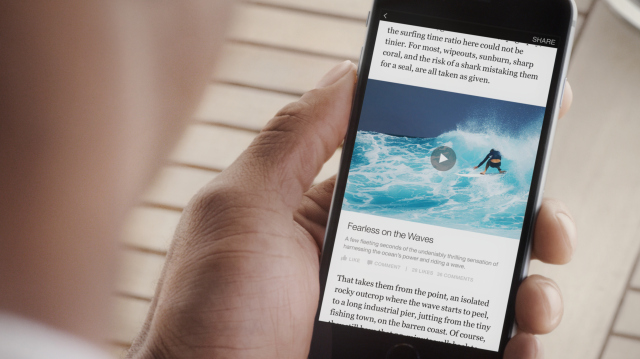
It’s almost impossible to find fault with Facebook’s Instant Articles from a reader’s perspective. Facebook’s new Instant Article platform presents us with a beautiful user experience, with interactive features such as auto-play videos that come alive as you scroll, high-resolution photos you can zoom in on and explore by tilting your phone, and interactive maps.
All this to prevent us from ever leaving Facebook’s anti-Google gated walls.
Facebook stated the Instant Articles platform is their commitment to “improving the reading experience for the user.” Facebook points out that every time a user is redirected to content outside their platform, this content takes 8 seconds to load, and represents “by far the slowest single content type on Facebook.”
Facebook is right to point out the clunky user experience we experience when consuming content on mobile, which is increasingly overtaking our PC/desktop usage. TechCrunch reported last year that “mobile usage as a whole accounted for 60% of time spent online by US users.” More importantly, as desktop-based content consumption continues to drop, so too has our attention span.
The deal cut with major publishers (including The New York Times, The Guardian, and BuzzFeed) posting their content on Instant Articles is (so far) pretty sweet. According to Facebook: “Publishers can sell ads in their articles and keep [100%] of the revenue, or they can choose to use Facebook’s Audience Network to monetize unsold inventory (with Zuckerberg taking a 30% cut if opting for the second option).”
What about brands?
There is ongoing speculation over whether Facebook will open Instant Articles to brands: if yes, it means we will see an increase in native advertising on our newsfeeds. If no, we will still see an increase in native advertising on our newsfeeds: via sponsored posts by publishers who have signed agreements with Facebook. This is already the case with BuzzFeed, where:
“Facebook will allow BuzzFeed to upload its “sponsored posts” — BuzzFeed stories it creates on behalf of advertisers — into its “Instant Articles” format, and treat it just like any other story from any other publisher.”
Yes or no, the end result will be the same: brands (including publishers) will increasingly see themselves trading in their Search traffic for Facebook traffic.
From a marketer’s perspective, this is a terrible trade off. A study by Conductor examined the inbound traffic of 30 websites across six different industries over one year, and found:
“Natural search drives the most traffic of all channels, responsible for nearly half (47%) of all visits. In breaking out social visits from overall referral visits, we can see that referrals drive 15% of visits, while social actually drives 2%.
Hubspot’s Kipp Bodnar pointed out that when a reader consumes content on the Instant Articles platform, they are more likely to “go back into Facebook and read a different Instant Article from a different site.” And consequently “Facebook Instant Articles make the publisher of the content less relevant.”
So will an increase in Facebook traffic be worth the risk of brand dilution AND decrease in search traffic? With referrals and social only making up 17% of a website’s traffic sources, probably not.
Final considerations:
How do users currently perceive the content they see on Facebook? According to a 2014 report by the American Press Institute: “Only 15% of adults who get news through social media say they have high levels of trust in information they get from that means of discovery.”
Personally, despite clicking on articles that are pushed to the top of my Facebook newsfeed, I still double-check Twitter to make sure I receive a fuller picture for coverage on breaking news and stories. We know Facebook’s algorithms prioritize content based on popularity (through accumulated likes and shares), and sponsored posts by brands. For this reason I’m highly doubtful Facebook is able to capture the more nuanced and niche content that I may want to read on any given topic, and consequently would be very reluctant to treat Facebook as a primary news-platform.
When you factor in Facebook’s history of newsfeed algorithm manipulation, and increasingly placing certain (paid) content above others, this will raise troubling questions of censorship and net neutrality if Instant Articles prove to be a successful venture into digital journalism for Facebook (and from a reader’s perspective, its pretty hard to fault the seamless UX). How trustworthy Facebook users will perceive the content they consume, however, will be a different story.
